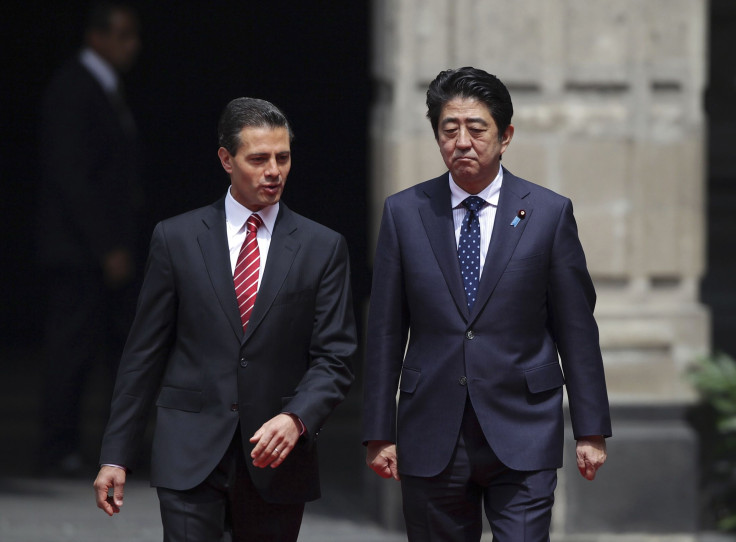China-Japan Rivalry Plays Out In Latin America

Japanese Prime Minister Shinzo Abe departed Friday for an 11-day trip through Latin America, just two days after Chinese President Xi Jinping wrapped up his own Latin America tour, signaling that Japan may be looking to challenge China’s influence in the region.
Abe’s itinerary includes Mexico, Colombia, Trinidad and Tobago, Chile and Brazil. Japanese media reported that he was looking to shore up economic ties with Latin America, and also round up support for Japan's bid for a rotating seat at the U.N. Security Council, which is up for vote in October 2016.
“I want to promote Japan and bring it closer to the countries of this region, whose potential is unlimited,” Abe told reporters before departing Tokyo, according to the Latin American Herald Tribune.
The timing of Abe’s trip highlights Latin America’s growing role as a battleground for longtime rivals Japan and China to compete for global influence. President Xi, who visited the region last week, signed a flurry of economic deals with Brazil, Venezuela, Argentina and Cuba, and committed to a $35 billion fund for regional projects. But although Japanese trade with Latin America has doubled over the past decade, it still has a long way to go before it can reasonably compete with China’s offerings. Japanese newspaper Asahi Shimbun noted that Brazil-China trade is still five times greater than trade between Brazil and Japan.
Brazil and Mexico, Latin America's biggest and second-biggest economies, are obvious magnets for Japanese trade and investment. Japan, Chile and Mexico are also parties to the Trans-Pacific Partnership, a major free-trade agreement under negotiation that, if passed, would cover nearly 40 percent of global trade.
But it's the small island nation of Trinidad and Tobago that may be Abe’s most politically important stop. There, he will attend the first Japan-Caribbean Community (CARICOM) summit along with delegates from 14 member countries, all of whom are voting members of the United Nations.
China, which holds a permanent seat on the Security Council, has vigorously opposed Japan’s U.N. bid. Five of CARICOM’s 14 member countries recognize Taiwan as a separate country from the People's Republic of China, signaling that they could be persuaded to sympathize with Japan’s cause over China’s. Xi notably also made a visit to Trinidad and Tobago in February.
Chinese media reports on Abe’s visit waxed skeptical about Japan’s prospects for competing with China in Latin America. “I don’t think Japan could have a very strong competition with China in this regard,” said Teng Jianqun, a senior research fellow at the China Institute of International Studies, in an interview with Chinese news network CCTV, noting that China was already far ahead in its diplomatic and economic presence in the region. Meanwhile, a commentary in Beijing News called Japan’s efforts to gain a Security Council seat a “political show.”
The two East Asian nations have been mired in longstanding disputes over Japanese crimes in World War II, regional security and competing claims to resource-rich islands in the East China Sea, known as the Senkakus in Japan and Diaoyu Islands in China. Earlier this month, Abe also led an effort to reinterpret Japan’s so-called “peace constitution” and lift a ban on fighting overseas conflicts, a move that has ratcheted up East Asian tensions even further.
© Copyright IBTimes 2024. All rights reserved.






















